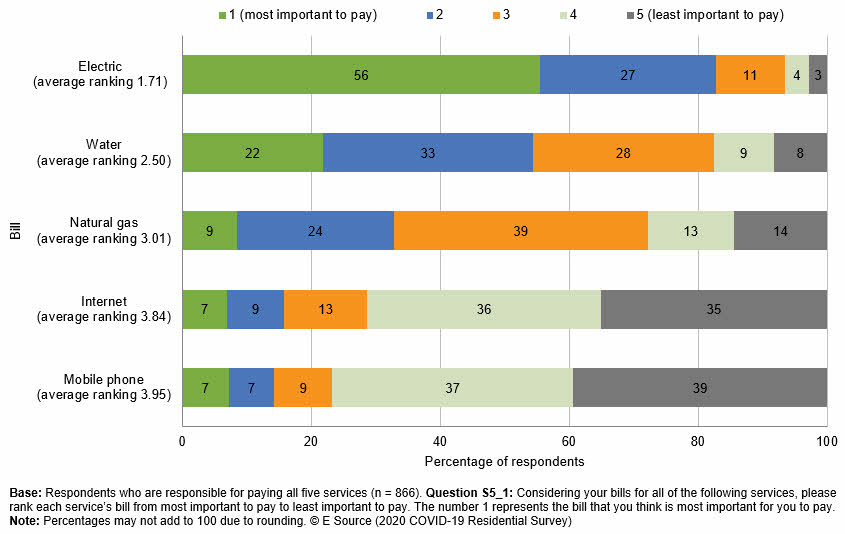Your customers want to pay their utility bills on time and in full. They understand the importance of keeping their energy services on, especially as many are working from home during COVID-19. But due to financial concerns, some of your customers have needed to prioritize certain household bills over others during the pandemic.
We fielded the 2020 E Source COVID-19 Residential Survey to gather insights into residential customers’ needs during and after the pandemic. In the survey, we asked respondents what service bills were most important for them to pay first. They told us, “Utilities aren’t optional” and ranked their electric, water, and natural gas bills as the most important to pay (figure 1).
Figure 1: The most important bills to pay
We asked respondents to explain why specific bills were more important to pay than others. Here are some of their answers, illustrating the tough choices they make in deciding what bills to pay:
- Necessities. I WANT phone and internet, but I NEED electricity, water, and gas.
- All bills get paid on time. [I] sacrifice food and clothes to do so.
- I need essential utilities over entertainment.
- Internet is required for our jobs at the moment, so that is far away the most important.
- Electricity, gas, and water are essential for life. I need the internet to work from home.
You’ve provided customers with safe and reliable energy throughout the pandemic by putting moratoriums on disconnections for nonpayment. However, some of those policies are coming to an end and that brings uncertainty for customers.
Here are examples of what you can do to continue helping your customers after moratoriums end:
- Implement alternative pricing packages such as off-peak usage, demand-reduction pricing, or automated load reduction.
- Establish data-sharing agreements with other utilities. For example, if a customer applied for an income-assistance program with their electric utility, then that utility would share that customer information with other local utilities. That way, if the customer applied for a similar program with their water utility, then they wouldn’t have to input all necessary data to apply, as the utility would already have it stored.
- Offer different billing options such as prepay or budget billing.
- Offer billing alerts to avoid bill shock and to prevent customers from overspending.
- Let customers know about any utility or federal energy-assistance programs.
- Provide simple energy-saving tips.
- Let customers know you’re willing to work with them to keep their utilities on.
To learn more about our findings from the COVID-19 Residential Survey, call us at 1-800-ESOURCE (1-800-376-8723) or email us.

